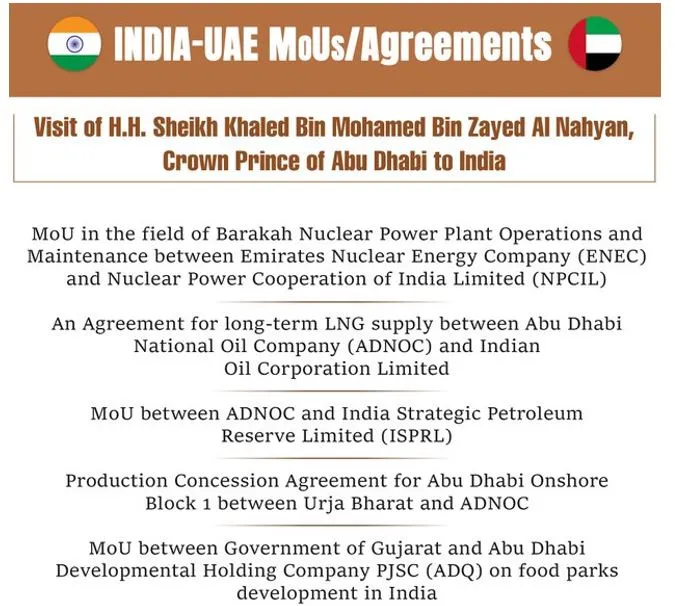

10th September 2024 (12 Topics)
Context
India and the United Arab Emirates inked four major pacts that will facilitate crude oil storage, long-term supply of LNG and cooperation in the civil nuclear energy sector as Prime Minister Narendra Modi held wide-ranging talks with Abu Dhabi Crown Prince Sheikh Khaled bin Mohamed bin Zayed Al Nahyan focusing on boosting overall strategic ties.
Breakdown of the key deals
India and the United Arab Emirates (UAE) have recently signed four significant agreements to strengthen their strategic partnership. Here’s a breakdown of the key deals:
- Long-Term LNG Supply Agreement: Abu Dhabi National Oil Company (ADNOC) will supply 1 million metric tonnes of liquefied natural gas (LNG) annually to Indian Oil Corporation Ltd (IOCL).
- Context: This is the third such LNG contract signed in over a year, with IOCL and GAIL previously securing similar agreements for 1.2 million metric tonnes per annum (MMTPA) and 0.5 MMTPA, respectively.
- Crude Oil Storage and Management: ADNOC and India Strategic Petroleum Reserve Ltd (ISPRL) have signed a Memorandum of Understanding (MoU) to explore additional opportunities for crude oil storage in India. This includes renewing their existing storage agreement.
- Background: ADNOC has been storing crude in ISPRL’s Mangalore cavern since 2018, with a total of 5.86 million barrels stored. This helps India manage energy security during global supply disruptions.
- Civil Nuclear Energy Cooperation: Emirates Nuclear Energy Company (ENEC) and Nuclear Power Corporation of India Ltd (NPCIL) have agreed to enhance cooperation in nuclear power. This includes operating and maintaining nuclear plants, sourcing nuclear materials from India, and exploring investment opportunities.
- This agreement builds on recent advancements, such as the completion of the Arab world’s first nuclear power plant in Abu Dhabi, which will generate 40 terawatt-hours of electricity annually once fully operational.
- Production Concession Agreement: A concession agreement for Abu Dhabi Onshore Block 1 was signed between ADNOC and Urja Bharat, a joint venture of Indian Oil Corporation Ltd (IOCL) and Bharat Petro Resources Ltd. This allows Urja Bharat to bring crude oil to India, supporting the country’s energy security.
- This is the first such agreement involving an Indian company operating in the UAE.
- Food Park Development: A Memorandum of Understanding (MoU) between the Gujarat government and Abu Dhabi Developmental Holding Company (ADQ) will set up a food and agriculture park in Gundanpara, Ahmedabad. The project is expected to start by the second quarter of 2025.

Bilateral Relations:
Strategic partnerships vs comprehensive strategic partnership
|
More Articles


